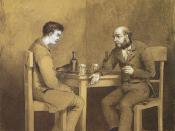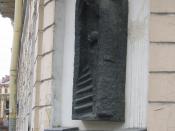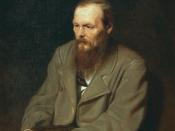Meta-criticism of Crime and Punishment
In "Critical Responses to Crime and Punishment", two critics' approaches to Fyodor Dostoevsky's Crime and Punishment are juxtaposed with both favorable and negative opinions on the Russian novel. I. Pisarev in his review of the novel, "The Struggle for Life", outlines a fierce objection, accusing the author of painting his protagonist, Raskolnikov, as "a madman whom Dostoevsky attempted to portray as typical of the younger generation". Regardless, Pisarev goes on further to congratulate Dostoevsky on his "accuracy and understanding with which Dostoevsky portrayed the contemporary social reality". Pisarev creates the silhouette of what he believes to be the ultimate faults of the novel: Raskolnikov's "continued wrangling with himself over the motivation of his crime", his "feelings of guilt", and finally the undeniable fact-accredited deduction Raskolnikov resides in a world of self-perpetuated poverty. Another critic in the spotlight of the article is then given a stepping stone to enter the debate, A.
I. Vvedenskij. One of Vvedenskij's contentions against the novel is as well the aforementioned choice Raskolnikov consciously makes to stay poor. Vvedenskij goes on to state "had he wished, Raskolnikov could have made a living as a translator or a tutor (like his friend, Razumihin)" and in fact is presented with work from Razumihin which he immediately turns down. Another objection Vvedenskij brings up is the counter-intuition Raskolnikov composes himself with post-murder. The murdering of the pawn lady was committed for gain yet he "immediately hid away the loot and determined not to make any use of it". Vvendeskij switches to a psychological thread of thought and states his belief of a Freudian influence evident in Dostoevsky's work. Vvendeskij describes Raskolnikov's dreams, in particular a dream he has about "the killing of the overburdened horse in Part I". Vvedenskij thought...


